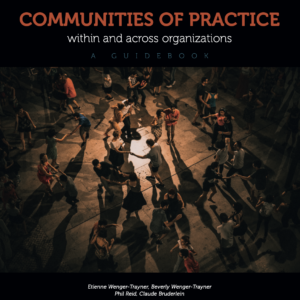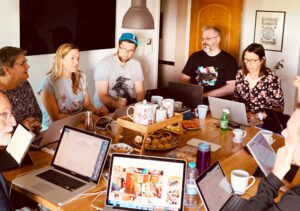NOTICE: There is an updated version of all these FAQs on our new website:
We see it as our mission to develop a theory and practice of social learning – for individuals, communities, organizations, and society more generally. So this concept is fundamental for us.
Etienne’s work on social learning theory places learning at the core of human existence and assumes that it is fundamentally a social phenomenon. Learning is the foundation of who we are (becoming). It is social because our human nature is social, not just because (or when) we interact with others or use certain tools.
We are aware of the current trend to focus conversations about social learning on social media. We understand this trend because, indeed, emerging social media technologies are surprisingly aligned with the tenets of social learning theory. We believe that this is precisely why they constitute such an important trend. But it is the social nature of human learning that makes these tools so relevant today, and potentially transformative, not the tools that make human learning suddenly social.
We want to promote this broader view of social learning and base our work on it, whether it is theoretical work on social learning capability or practical work with organizations, governments, and international development projects. All these areas can benefit from taking a deeply social view of learning.
While social learning has never been about social media, we agree that a theory and practice of social learning today certainly can’t ignore these emerging technologies. They open countless new avenues for the social nature of human learning to manifest and in some cases, expand.
Even so, we want our work on social learning to explore this social nature in its essence, while seeing social media as a recent phenomenon to be explored and leveraged. What makes all this exciting is the convergence of multiple trends: the increasing acceptance of social learning theory, the explosion of social media, the rise of social networks, the need to anchor organizational strategies, public policy, and developmental imperatives in a social understanding of learning, and the globalization of learning challenges.
| << What is a social artist? | What is a community of practice? >> |
For more information, click here:
For a more precise definition, see our theory page on social learning spaces:
For a bit more info, see our general (but brief) introduction to communities of practice and their use in various contexts:
For practical advice on cultivating communities of practice, see our new guidebook:
For workshops on cultivating communities of practice:



Pingback: What is a community of practice? | Wenger-Trayner
Pingback: Social artists | Wenger-Trayner
Thank you for providing all of these insightful documents. I am exploring Communities of Practice to inform my socio-cultural evaluation research with a science, technology, engineering, and mathematics (STEM) educational initiative in a city that calls itself “America’s First STEM Community” as of 2012. Fascinating. Thank you Thank you!
I see a disconnect between social learning (as lived in a community of practice) and social-media learning (eg, Facebook, Twitter). The former sets conditions for deep learning over time–through practice, conversation, and reflection–whereas the latter appears to support superficial, 140-character “learning.” Social-media technologies seem to have the effect of favoring connections and brief, headline-based conversations over longer, content-focused, deep conversations.
Thoughts?
Well, yes, there is a wide range of phenomena that would fall under the rubric of social learning, in the same way that our social life consists of both fleeting connections and deeper relationships. We see these as having complementary effects on social learning capability.
I just realised I was looking for your perspective and definition of social learning, but it is not quite stated in this FAQ. Or is it this “Etienne’s work on social learning theory places learning at the core of human existence and assumes that it is fundamentally a social phenomenon”? I ask because most people quote Bandura’s definition but my experience of you two and your work lead me to believe yours is more refined around the person to person aspects, vs the focus on learning by watching. Help?
Hi Nancy… yes, we have updating this entry on our to-do list. We were hoping no-one would notice!! Actually, we are in the process of transforming our own thinking about it (very exciting) as we write our book… so give us a few weeks.
Bandura is a social psychologist (and he later morphed the expression “social learning theory” to “social cognitive learning theory”). It is a theory for understanding, predicting, and changing human behavior through interactions rather than a theory about how the social world is organized as a learning system.
Social learning in the way we use it is a flow – or a chain of events – that involves people engaging with each other and which leads to a change in something they care about. So yes, it’s more about person to person aspects that go somewhere. This is important if you view human beings as fundamentally social beings not just interacting beings.
Pingback: Communities of Practice Toolkit - slightly updated | Full Circle Associates